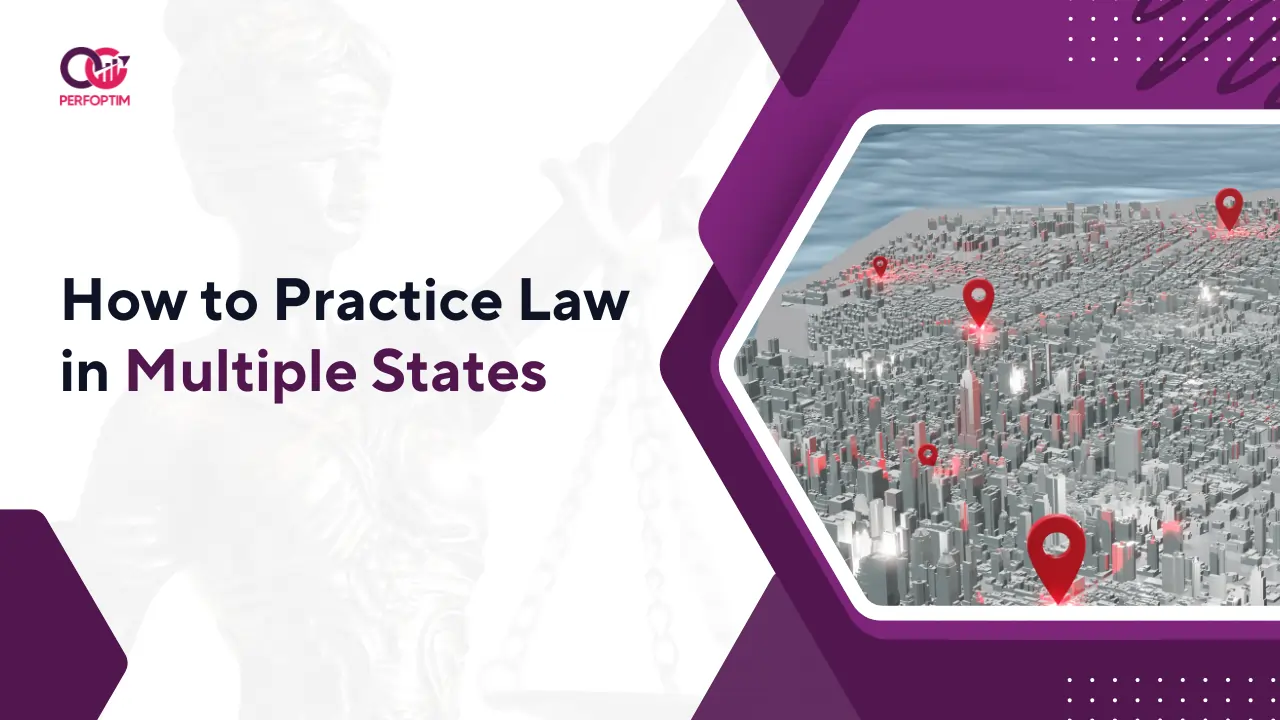How to Practice Law in Multiple States
Passing the bar exam is the most difficult step in your path to becoming a lawyer, and after you’re licensed in your state, you may never want to worry about it again. But what if you have to move? Or what if you discover a large pool of potential clients just beyond the state line? Can you practice law in several states?
It is feasible to become a multi-state lawyer, and the greatest part is that you may not even be required to take several bar exams. Read on to discover more about how to practice law in numerous states and the advantages it might provide.
Practicing law across multiple states is increasingly common due to the rise of remote and hybrid legal services. Attorneys seek multistate practice to expand their client base, handle diverse cases, and adapt to a digital-first legal landscape. This guide outlines the steps to navigate multistate legal practice effectively.
Contact us for a free website audit here.
Can Lawyers Practice in Any State?
Short Answer: No, lawyers cannot automatically practice in any state.
Each U.S. state has its own licensing rules, bar exam requirements, and ethical guidelines. Practicing law in a state where you’re not licensed may be considered the unauthorized practice of law (UPL) — a serious offense.
Let’s break this down.
Why Lawyers Can’t Practice in All States by Default
Each state has a state bar association that sets rules for:
- Licensing
- Continuing legal education (CLE)
- Ethical obligations
- Disciplinary actions
So, being licensed in California doesn’t give you the right to practice in Texas or New York unless:
- The state has reciprocity rules
- You’ve passed the state’s bar exam
- You’ve obtained a temporary or limited license
Ways to Practice Law in Multiple States
1. Pass the Bar in Each State
You can take the bar exam in every state you wish to practice in.
Pros:
- Full access to legal practice
Cons: - Time-consuming, expensive, and requires a lot of study
2. Use Bar Reciprocity or Admission on Motion
Some states allow licensed attorneys from certain other states to apply without taking the bar exam again. This is called admission on motion.
Example: Reciprocity Map (Simplified)
| Your Licensed State | States with Reciprocity |
|---|---|
| New York | DC, Illinois, Massachusetts, others |
| Texas | District of Columbia, Idaho, others |
| California | ❌ No general reciprocity |
3. Uniform Bar Exam (UBE)
The UBE is accepted in 41+ jurisdictions and allows score transfer across UBE states.
Key Features:
- Single exam: covers general legal principles
- Transferable: Use your score to apply in other UBE states
- Some states may still impose additional requirements
🧠 Learn more about Uniform Bar Examination
4. Pro Hac Vice Admission (Temporary Use)
Allows you to work on a single case in a different state, with permission from a local attorney.
Use cases:
- High-profile federal litigation
- Corporate legal cases crossing borders
5. Federal Court Practice
If you’re admitted to a federal court, you can appear in cases there regardless of state bar admission (but only for federal law matters).
What Happens If You Practice Without a License?
Practicing without proper authorization can result in:
- Criminal penalties
- Permanent bar disqualification
- Civil lawsuits from clients
- Loss of reputation
🔗 Learn about Unauthorized Practice of Law
Why Become a Multi-State Lawyer?
Practicing in multiple states opens new revenue streams. It helps you serve more clients, expand your influence, and grow your law firm faster.
1. Serve Clients Across State Lines
Clients often have legal matters spanning multiple jurisdictions. Being licensed in more than one state lets you represent them without hiring co-counsel.
2. Increase Referrals and Partnerships
Multi-state lawyers build broader networks. You’ll get more referrals from out-of-state attorneys and become a valuable partner on complex cases.
3. Expand Your Practice Area
Want to handle federal litigation, corporate transactions, or immigration? Many of these practice areas benefit from multi-jurisdiction authority.
🔗 Boost your visibility across regions with Perfoptim’s local SEO
4. Grow Your Firm and Team
Scaling a firm becomes easier when you’re licensed in more than one state. You can open offices, hire local associates, and create regional landing pages to dominate search.
5. Get Competitive Edge in National Cases
Clients with high-stakes cases prefer lawyers who aren’t bound by state lines. It builds trust, reduces costs, and eliminates delays from finding additional counsel.
Remote Work for Multi-State Lawyers
The rise of remote work, accelerated by the COVID-19 pandemic, has raised questions about practicing law remotely across state lines. The American Bar Association (ABA) issued guidance in December 2020, stating that attorneys may practice the law of a jurisdiction where they are licensed, even if working remotely from another state.
However, you must ensure the remote jurisdiction allows this arrangement and avoid advertising that you are authorized to practice in a state where you are not licensed.
For example, a California-licensed attorney working remotely from Oregon cannot practice Oregon law unless licensed there, to avoid unauthorized practice of law (UPL) violations.
How to Become a Multi-State Lawyer
To practice law in multiple states, attorneys must navigate state-specific licensing processes. Here are the key steps to achieve this:
1. Understand State Bar Requirements
Each state has its own bar association and rules for legal practice. Attorneys must be admitted to the bar in each state where they wish to practice. Research the specific licensing requirements for each state, as they vary significantly.
Unfortunately, the UBE is still not acknowledged in many states and territories. Currently, the following jurisdictions do not accept the UBE:
- California
- Delaware
- Florida
- Georgia
- Hawaii
- Louisiana
- Mississippi
- Nevada
- South Dakota
- Virginia
- Wisconsin
- Guam
- Northern Mariana Islands
- Palau
- Puerto Rico
If you want to get licensed in these areas (or if you are already licensed in one of these states and haven’t taken the UBE), you’ll need to take another bar exam.
For many lawyers, taking a second bar exam sounds about as much fun as having teeth pulled. But most multi-state lawyers find that taking the bar the second time isn’t nearly as bad as the first.
2. Take the Uniform Bar Exam (UBE)
The UBE is a standardized bar exam that streamlines the process of becoming licensed in multiple states. It is accepted in over following states:
- Alabama
- Alaska
- Arizona
- Arkansas
- Colorado
- Connecticut
- District of Columbia
- Idaho
- Illinois
- Indiana
- Iowa
- Kansas
- Kentucky
- Maine
- Maryland
- Massachusetts
- Michigan
- Minnesota
- Missouri
- Montana
- Nebraska
- New Hampshire
- New Jersey
- New Mexico
- New York
- North Carolina
- North Dakota
- Ohio
- Oklahoma
- Oregon
- Pennsylvania
- Rhode Island
- South Carolina
- Tennessee
- Texas
- Utah
- Vermont
- Washington
- West Virginia
- Wyoming
- The Virgin Islands
It’s allowing attorneys to transfer their scores to other UBE jurisdictions, provided they meet state-specific score requirements and deadlines.
For example, North Carolina accepts UBE scores within two years, while South Carolina allows scores up to three years old. Always check the specific rules for each state.
3. Explore Reciprocity Agreements
Some states have reciprocity agreements, allowing attorneys licensed in one state to apply for admission in another without taking an additional bar exam.
However, reciprocity often requires meeting specific conditions, such as a minimum period of active practice or additional application fees. Confirm whether the states you’re targeting offer reciprocity and what documentation is needed.
4. Consider Pro Hac Vice Admission
For temporary practice in a state where you are not licensed, you can apply for pro hac vice admission. This allows attorneys to represent clients in specific cases with court approval, often requiring sponsorship by a locally licensed attorney. This option is ideal for one-off cases but is not a substitute for full licensure.
5. Complete the Application Process
Applying for admission in a new state can be time-consuming and costly.
For example, transferring a UBE score and applying for admission in North Carolina can cost nearly $4,000, including application fees, licensing fees, and bar dues. Some states, like North Carolina, may also require extensive references, such as contact information for multiple attorneys and former clients. Plan ahead to manage these costs and requirements efficiently.
Challenges of Practicing Law in Multiple States
While multi-state practice offers many benefits, it also presents several challenges:
- High Costs: Maintaining licenses in multiple states can be expensive. Annual license fees typically range from $200 to $500 per state, and continuing legal education (CLE) courses can cost hundreds more. These costs add up quickly when managing multiple licenses.
- CLE Requirements: Each state has unique CLE requirements, such as Virginia’s 12 annual credits or New York’s biennial requirements. Keeping track of deadlines and completing courses for multiple states can be time-consuming. Creating a spreadsheet to monitor requirements and deadlines is a practical way to stay organized.
- Marketing Challenges: Marketing a law firm across multiple states is complex. Clients may get confused if your website lists multiple practice locations, and optimizing search engine optimization (SEO) for different regions requires a tailored strategy. You may need multiple websites or assistance from a legal marketing agency to maintain a strong online presence in each state.
- Navigating Different Laws: Each state has unique legal codes and regulations. Practicing in multiple jurisdictions requires staying current on diverse statutes and case law, which can be demanding but also enriches your legal expertise.
Marketing Your Multi-State Law Practice
Effective marketing is critical for multi-state lawyers to attract clients in different regions. Here are some strategies to consider:
- Optimize SEO for Each Region: Tailor your website’s SEO strategy to rank highly in local search results for each state you practice in. This may involve creating separate landing pages for each region or working with a legal marketing agency like LawRank to manage your digital presence.
- Clarify Practice Areas and Locations: Clearly differentiate the regions you cover on your website to avoid client confusion. For example, a client in Vermont should immediately understand that you also practice in Connecticut without misinterpreting your scope of services.
- Leverage Digital Marketing: Use content marketing, social media, and pay-per-click (PPC) advertising to reach potential clients. Agencies like LawRank can help create authoritative content and manage ad campaigns to boost your visibility in competitive markets.
- Consider Multiple Websites: In some cases, maintaining separate websites for each state can enhance clarity and improve local SEO performance. A marketing agency can assist in designing mobile-responsive, WordPress-based sites that are portable and effective.




